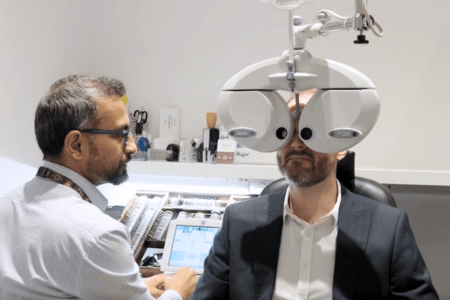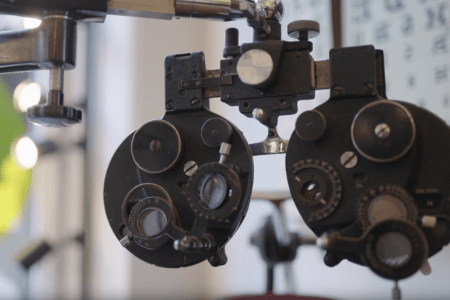
World Sight Day is an annual reminder that eye health is not just about vision, it can also indicate overall wellbeing. Regular eye examinations can reveal early signs of systemic health conditions, allowing timely intervention and support. According to the World Health Organization (WHO, 2025), over 2.2 billion people globally have vision impairment, many of which could be prevented or treated with early detection.
Did you know that the following conditions can be detected through eye examinations?
High Blood Pressure – Hypertensive Retinopathy: Chronic high blood pressure can damage retinal blood vessels, sometimes before symptoms appear. Subtle signs such as narrowing arteries or small retinal haemorrhages may be visible during an eye exam (Cleveland Clinic).
Diabetes – Diabetic Retinopathy: Early changes in the retinal blood vessels, including microaneurysms or swelling, can indicate diabetes or worsening blood sugar control (Mayo Clinic).
Cholesterol and Vascular Issues – Retinal Cholesterol Deposits: Cholesterol plaques (Hollenhorst plaques) can appear in retinal arteries, signalling broader vascular or cardiovascular risk (Cleveland Clinic).
Neurological Conditions – Optic Nerve Changes: Inflammation or subtle changes in the optic nerve can indicate neurological conditions, including autoimmune disorders such as multiple sclerosis (Cleveland Clinic).
Eye exams not only reveal what’s happening in the rest of the body, they also help us detect conditions that directly affect your vision.
In addition to revealing signs of systemic health conditions, regular eye examinations are also key in detecting and managing eye-specific diseases. Glaucoma (the most common cause of irreversible blindness worldwide) often develops silently, without noticeable symptoms until advanced. Early detection through pressure checks and optic nerve assessment is essential to preserve sight. Cataracts and age-related macular degeneration are also leading causes of vision loss that can be identified and managed early with appropriate referral and monitoring.
At Whitby & Co., we also diagnose and treat common conditions such as dry eye and blepharitis, both of which can cause irritation, redness, and blurred vision but respond well to tailored management and lifestyle advice. Even without underlying systemic conditions, digital eye strain is increasingly common in a world of prolonged screen use and symptoms often include eye fatigue, blurred vision, headaches, or neck and shoulder tension. The good news is that there are simple, practical steps you can take to protect your vision and overall health. Regular eye examinations remain key to prevention as they allow your optician to detect early signs of conditions like high blood pressure, diabetes, or vascular changes, sometimes before other symptoms appear.
It’s also important to pay attention to your eyes on a daily basis. If you notice changes such as blurred vision, eye fatigue or new discomfort, we highly recommend you seek advice. Maintaining your general health, including blood pressure, blood sugar and cholesterol, supports both your eyes and overall wellbeing.
For those spending significant time in front of screens, simple adjustments can make a big difference. Optimising your workstation, taking regular breaks, and using appropriate lighting reduces strain and helps your eyes stay comfortable throughout the day.
At Whitby & Co. we provide comprehensive eye examinations for all ages, tailored to your individual needs. Our team can screen for systemic health indicators visible in the retina, offer advice on managing digital eye strain and recommend lens options to maximise comfort. Our goal is to help you maintain long-term visual health and clarity, so you can feel confident and comfortable in your eyes every day.
Sources:
World Health Organisation – WHO, 2025 – Blindness and Visual Impairment Cleveland Clinic https://my.clevelandclinic.org/health/diseases/25100-hypertensive-retinopathy Mayo Clinic https://www.mayoclinic.org/diseases-conditions/diabetic-retinopathy/symptoms-causes/syc-20371611 Cleveland Clinic https://my.clevelandclinic.org/health/diseases/25136-hollenhorst-plaques Cleveland Clinic https://my.clevelandclinic.org/health/diseases/14256-optic-neuritis





